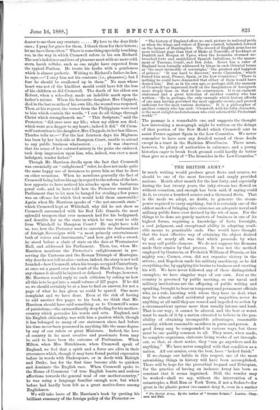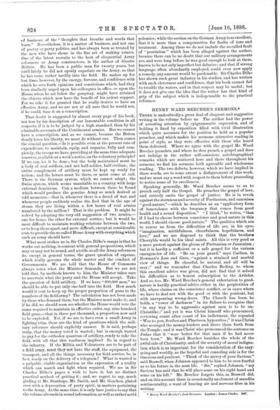THE BRITISH ARMY.* IF much writing would produce great fleets
and armies, we should be one of the most favoured and amply provided nations. Month after month for the last forty, and especially during the last twenty years, the inky stream has flowed on. without cessation, and enough has been said, if saying could. do it, to create a hundred armies and a thousand fleets. That is the mode we adopt, no doubt, to generate the steam- power required to carry anything ; but it is certainly one of the oddest modes of bringing into existence an adequate naval and military public force ever devised by the wit of man. For the things to be done are purely matters of business in one of its. highest forms, requiring a knowledge of facts, foresight, a cool judgment, and exceptional ability in adapting avail- able means to practicable ends. One would have thought. that the least effective way of attaining the object desired by all, or nearly all, was that which proceeds by what. we may call public clamour. We do not suppose the Romans made their armies by that process. It was not the method_ employed by Gustavus, or Frederick William of Prussia, or his mighty son ; Carnot, even, did not organise victory in the streets; and Napoleon made his military machinery, as he did. everything else, by applying his brains to business and exerting his will. We have never followed any of these distinguished examples; we have singular ways of our own. Just as the country is governed by public meeting, so our naval and. military institutions are the offspring of public writing and speaking, brought to bear on temporary and permanent officials. who, as a rule, knowing with whom they have to deal, what may be almost called accidental party majorities, never do anything at all until they are roused and impelled to action by a circumambient uproar more than usually intense and loud. That is our way; it cannot be altered, and the best or worst must be made of it by a nation educated to believe in the pos- sibility of obtaining incompatible advantages, reasonable security, without reasonable sacrifices in purse and person. A good Army may be compounded in various ways, but there must be one quality common to all. They must, when made, be complete organisms, elaborate living works of art through- out, so that, at short notice, they "can go anywhere and do anything." We have never complied with that condition as a. nation. All our armies, even the best, have "lacked finish."
If we change our habits in this respect, one of the most. astonishing things in history will have been accomplished.. There will be hope for the proverbial leopard and Ethiopian, for the practice of having an inchoate Army has been so constant that it seems ingrained. Still, the wonder may be worked—shall we say, without the intervention of a. catastrophe, a Bull Run or York Town, if not a Sedan P—for great is the plastic power (we cannot deny it, even in a matter • The British Army. By the Anther et "Greater Britain." London : Chap. man and Ball. of business) of the " thoughts that breathe and words that burn." Nevertheless, it is a matter of business, and not one of poetry or party politics, and has always been so treated by the men who have shone in the fine art of making armies. One of the latest recruits to the host of eloquential Army reformers or Army constructors, is the author of Greater Britain. He has been a public man for twenty years, but until lately he did not openly expatiate on the Army, so that he has come rather tardily into the field. He makes up for lost time, however, by the energy, fervour, and confidence with which he sets forth opinions and convictions which, had they been similarly urged upon his colleagues in office, or upon the House when he sat below the gangway, might have attained the objects which now have the benefit of his ardent support. For we take it for granted that he really desires to have an effective Army, and we are not at all sure that he would not, if he could, base it on a conscription.
That doubt is suggested by almost every page of his book, not less by his description of our lamentable condition in all respects, if it is to be judged by a high standard, than by his admirable accounts of the Continental armies. But we cannot have a conscription, and as we cannot, because the Briton dearly loves his liberty, we must do without one. Then comes the crucial question,—Is it possible, even at the present rate of expenditure, to maintain, equip, and organise, fully and com- pletely, the troops we have, providing at the same time adequate reserves, available at a week's notice, on the voluntary principle? If we can, let it be done ; but the body maintained must be a body of real soldiers, and not half-soldier, half-civilian ; the entire complement of artillery must be kept up ready for action ; and the horses must be there, or must come at call. There is the German system, which we cannot adopt ; the Swiss system, which seems unsuitable to a country with large external dominions. Can a medium between these be found which would produce the genuine Army so much desired at odd moments,—that is, whenever there is a dread of war, and whenever people suddenly realise the fact that in the age of steam they are living within a few hours of real armies numbered by the million ? That is the problem. It might be solved by adopting the very old suggestion of two armies,— one for home, the other for external service ; but it would be most difficult to maintain working relations between the two, or to keep them apart, and more difficult, except at considerable cost, to provide the so-called Home Army with everything which such an army should have.
What most strikes us in Sir Charles Dilke's essays is that he works out nothing, is content with general propositions, which may or may not be sound, and avoids, as all the Army reformers do, except in general terms, the grave question of expense, which really governs the whole matter and the conduct of Governments. We are told that the House of Commons always votes what the Minister demands. But we are not told that, by methods known to him, the Minister takes care to ascertain what the party and the House will accept. Take the question of field artillery. If we have "600,000 men," we should be able to put only one-half into the field. How much would it cost to keep up the proper proportion of guns to the numbers of the field army ? The calculation has not been made by those who demand them, but the Minister must make it; and if he did, we should soon see whether the House would vote the sums required to maintain in effective order, say, nine hundred field guns,—that is, three per thousand, a proportion now said to be exploded. Yet, if we are to have even a small Army in fighting trim, these are the kind of questions which the mili- tary reformer should explicitly answer. It is said, perhaps truly, that the money voted is wasted ; but is enough wasted to pay for the orthodox quantum of artillery, ready to take the field, with all that this readiness implies? So in regard to the infantry. If the Militia and Volunteers are to be part of a field army, must they not have the staff, the equipment, the transport, and all the things necessary for field service, be, in fact, ready on the delivery of a telegram ? What is wanted is a palpable, visible organisation as the expression of a reality which can march and fight when required. We see in Sir Charles Dilke's pages a wish to have it, but no distinct practical method of getting it ; and, we regret to say, much girding at Mr. Stanhope, Mr. Smith, and Mr. Goschen, plated over with a deprecation of party spirit, in matters pertaining to the Army. At the same time, it is only bare justice to say that the volume abounds in sound information, as well as rather acrid
polemics; while the section on the German Army is so excellent, that it is more than a compensation for faults of tone and treatment. Among these we do not include the so-called fault of " pessimism " which has been alleged against the author, because there can be no doubt that our military arrangements are, and were long before he was good enough to look at them, known to be not only imperfect but delusive; and that if strong language, often abundantly employed, could even now apply a remedy, any amount would be pardonable. Sir Charles Dilke has shown such great industry in his studies, and has written with such cleverness and confidence, that his book cannot fail to trouble the waters, and in that respect may be useful ; but it does not give one the idea that the writer has that kind of grip of the subject which is indispensable to the practical reformer.



































 Previous page
Previous page